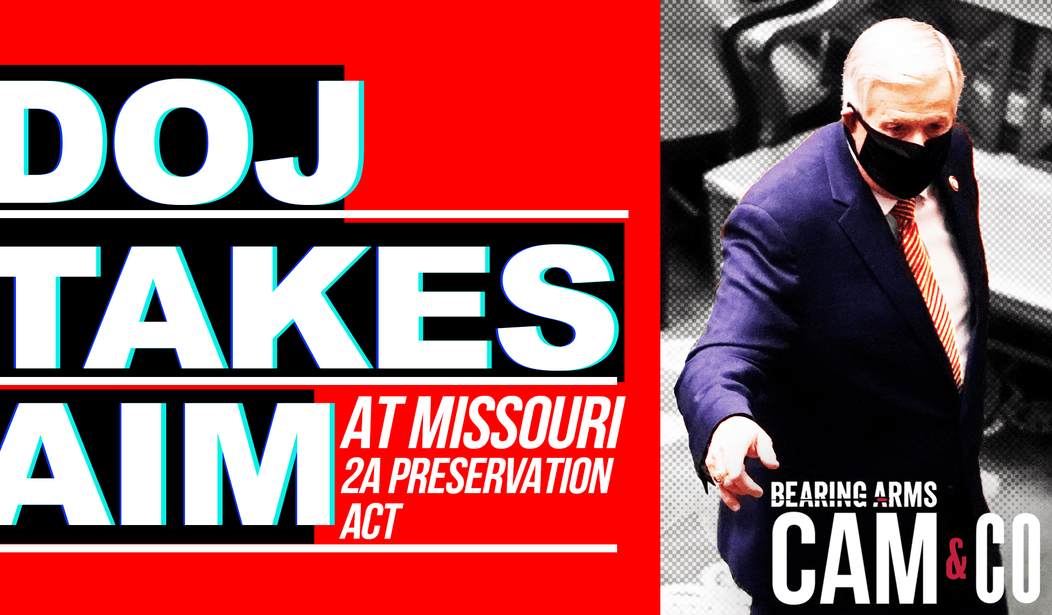In what may be a sign of a future federal lawsuit brought by Biden administration the Justice Department is weighing in on a state-level court challenge to Missouri’s new Second Amendment Preservation Act. The lawsuit, originally filed by St. Louis County, seeks to overturn the new measure signed into law earlier this year by Gov. Mike Parson, alleging that the provision blocking local and state law enforcement from assisting federal agencies in enforcing federal gun control laws is a violation of the Constitution’s Supremacy Clause.
The DOJ, not surprisingly, agrees with anti-gun politicians who’ve filed suit against the state. In a new “statement of interest” brief filed in response to the lawsuit, the Justice Department echoes the claims of St. Louis Mayor Tishaura Jones and St. Louis County Executive Sam Page.
The Missouri law, known as HB85, “has caused, and will continue to cause, significant harms to law enforcement within the State of Missouri,” wrote Brian M. Boynton, the acting head of the Justice Department’s civil division, along with the two top federal prosecutors in the state.
“HB85 undermines law enforcement activities in Missouri, including valuable partnerships federal agencies have developed with state and local jurisdictions,” they added. “It is also plainly unconstitutional under the Supremacy Clause.”
Actually, it’s not, any more than the Supreme Court has held that sanctuary city or state laws forbidding law enforcement from cooperating with ICE violate the Supremacy Clause. What the Court has said is that state and local governments cannot be compelled to enforce federal law, though to the best of my knowledge the Supreme Court has never weighed in on whether or not a state can compel political subdivisions to not cooperate with federal law enforcement agencies.
The Supremacy Clause nonsense isn’t the only questionable claim by the Justice Department either.
The 37-page filing lays out a detailed argument that Missouri’s law is an attempt to “nullify” the Constitution’s Supremacy Clause, which prohibits states from enacting laws that contradict federal statutes, with citations referring to two centuries of constitutional case law.
The Justice Department is basing its argument on the fact that the Second Amendment Preservation Act declares “laws, rules, orders, or other actions that collect data, restrict or prohibit the manufacture, ownership, and use of firearms, firearm accessories, or ammunition exclusively within this state” exceed the powers of the federal government, with a couple of exceptions. The SAPA further declares that those laws, rules, etc. that “infringe on the people’s right to keep and bear arms as guaranteed by the Second Amendment to the United States Constitution and Article I, Section 23 of the Missouri Constitution must be invalid in this state.”
I don’t think either section of the statute reaches the point of actually attempting to nullify federal law. Rather, the language defines the scope of the Second Amendment Preservation Act, but in no way tries to block or prohibit the federal government from enforcing any of its laws, including those that would be defined as an infringement of the Second Amendment rights of residents. Instead, the law precludes state and local police from cooperating in the enforcement of those laws, which again, is clearly within the precedent established by the Supreme Court in Printz v. United States.
Having said that, the Second Amendment Preservation Act isn’t written exactly as I would have preferred. I would have separated out Section 1 of the law dealing with arms, accessories, and ammunition that doesn’t leave the borders of Missouri, because that’s the weakest legal link in the new statute. However, the law does contain a severability clause, which means that even if one portion of the law is ruled unconstitutional, the rest of the law should remain intact.
The real heart of the Biden administration’s complaint is that the new law is making it harder to work with local law enforcement agencies, an argument echoed by an ATF agent in his own declaration before the court.
Frederic Winston, the special agent leading the Bureau of Alcohol, Tobacco, Firearms, and Explosives (ATF) Kansas City Field Division, also sounded off on the bill’s effect on law enforcement in a declaration filed with the court. He asserted looming risks associated with SAPA had led to the withdrawal of one dozen state and local officers, including from the Missouri State Highway Patrol and the Columbia and Sedalia police departments, from ATF operations.
“By withdrawing state and local officials from ATF task forces, ATF is no longer able to fulfill its duties as effectively, including preventing, investigating, and assisting in the prosecution of violent offenders. These state and local officials are critical members of ATF’s law enforcement efforts,” Winston said. “As a result of the withdrawals identified above, SAPA has negatively harmed law enforcement and public safety in Missouri.”
Winston may be entirely correct, but that doesn’t make the Second Amendment Preservation Act illegal. It is not up to state and local law enforcement agencies to serve as the ATF’s junior varsity, and they cannot be forced to do so, even if their departure makes it harder for the ATF to do its job. The ATF is a federal agency tasked with enforcing federal laws, and if it doesn’t have the resources necessary to fulfill its mission then that’s a federal issue, not a state or local concern.
The Biden administration is making it clear that it wants to compel local and state police departments to enforce whatever gun control laws, rules, or regulations it can put in place. If the circuit court in Missouri doesn’t go along with the DOJ’s argument, don’t be surprised to see Attorney General Merrick Garland directly challenge the Second Amendment Preservation Act… this time in federal court.









Join the conversation as a VIP Member